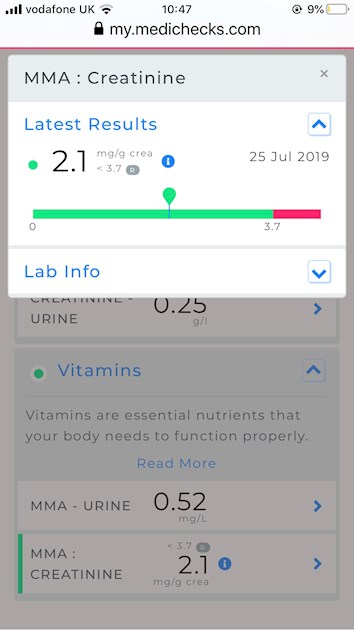Have lots of B12 def symptoms but last blood showed b12 at 460 down from 750, MMA showed inside ref range (attached picture). On an OATs test (organic acid test) a month later MMA showed higher in the ref range and b2 was non existent. Ferritin blood is 3 dropped from my usual 20 ish although haemoglobin ok, folate on the low side but within ref range, thyroid is borderline underactive with recent tsh at 4.3 was previously 5.5. (Have been on Nexium PPi for 6 years). Would any of this indicate low B12? Thanks
Not sure if low B12: Have lots of B1... - Pernicious Anaemi...
Not sure if low B12

I cannot see anything there that might suggest a B12 deficiency apart from the symptoms. But they overlap with so many other things that it's not possible to assign a deficiency purely on symptoms.
When I had an MMA urine test the normal range upper limit was specified as 0.4. Yours is showing 0.52, a modest elevation that might indicate a problem worthy of further investigation. If the reading reaches 0.75 it is said to be a clear indication of problems with B12 metabolism. MMA is said to be a specific and very sensitive test for B12 problems. When the haemotologists at St Thomas,'s Hospital reviewed the tests, increased homocysteine levels were the other important but less specific marker. They also recommend testing for active B12 levels rather than total B12 serum levels. Both serum levels can be made high by taking B12 supplements and folic acid and this is often discussed on this forum and in the various books on B12 deficiency.
Thank you for your reply, that’s really helpful! Is it a haematologist who deals with deficiencies of Vit minerals my GP not very knowledgable about them?
Hi, this is the real problem. Some haemotologists remain in the 20th century and are fixated on pernicious anaemia blood changes that are not always present. Your B12 serum levels seem well within the normal range if not taking supplements.
However, perhaps due to the efforts of the pernicious anaemia society, a panel of senior haematologists introduced new protocols for the treatment of B12 problems in 2014 .This is the BNF protocol that a GP should refer to and I believe has been accepted by NICE. If you have a strong family history, many symptoms especially neurological ,but 'normal' serum B12; the BNF indicates that injections should still be tried. Some GPs, who are often overstretched, don't have time to research matters and like to get a specialist opinion - which as I say can be problematic. Martyn Hooper's book 'What you need to know about PA & Vitamin B12 deficiency sets the scene very well, but he is not a clinician. Your GP might respond better to the BNF reference plus the primary care protocol in Dr Joseph Chandy's book ' Vitamin B12 deficiency in Clinical Practice - "Doctor, you gave me my life back".
This is a somewhat unusual book in that part of it is about Dr Chandy's fight to overcome resistance to his crusade that B12 problems are much more common than is generally accepted by the medical profession. He is therefore a controversial figure. He is also a devout Christian. Nevertheless, the sections on diagnosis and when and how to treat are very interesting - not to mention the very familiar case studies. Whether or not he is right that B12 problems may be behind a host of symptoms and conditions, his explanations of the interactions between the multiple endocrine system areas and how his many NHS patients responded to his B12 injections gives hope to the contributors of this forum. He gives a number of recent references that must have underpinned the BNF decision and as I say the protocol that he devised seems logical. He also discusses a rationale for the frequency of injections. The book is available from Amazon.
Please note that I am not a doctor, nor is my husband who has researched this for me. He is however a scientist who has an open mind to the progressive evolution of medical practice.